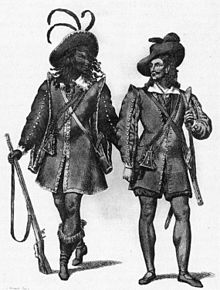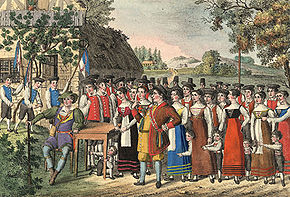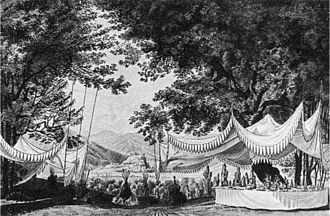- Der Freischütz
-
Carl Maria von Weber  Operas
Operas- Peter Schmoll und seine Nachbarn (1802)
- Silvana (1810)
- Abu Hassan ( 1811)
- Der Freischütz (1821)
- Euryanthe (1823)
- Oberon (1826)
- Die drei Pintos (completed by Gustav Mahler, 1888)
Der Freischütz (usually translated as The Marksman[1] or The Freeshooter.[2]) is an opera in three acts by Carl Maria von Weber with a libretto by Friedrich Kind. It premiered on 18 June 1821 at the Schauspielhaus Berlin. It is considered the first important German Romantic opera,[3] especially in its national identity and stark emotionality.[4] The plot is based on the German folk legend of the Freischütz and many of its tunes were inspired by German folk music. Its unearthly portrayal of the supernatural is especially poignant in the famous Wolf's Glen scene.[citation needed]
Contents
Performance history
Despite its daring innovations (and some scathing attacks by critics),[citation needed] it quickly became an international success, with some 50 performances in the first 18 months after its premiere on 18 June 1821 at the Schauspielhaus Berlin.[citation needed] Among the many artists influenced by Der Freischütz was a young Richard Wagner.[5] A version in French with recitatives was prepared by Hector Berlioz for a production at the Paris Opera in 1841.[6] This was revived at the Paris Opéra-Comique in 2011.[7]
The overture and the "Huntsmen's Chorus" from Act 3 ("With princely enjoyment and manly employment ...") are often performed as concert pieces.
Roles
Role[8] Voice type Premiere Cast, 18 June 1821[9]
(Conductor: Carl Maria von Weber)Max, an assistant forester tenor Karl Heinrich Stürmer Kilian, a wealthy peasant baritone August Wiedemann Cuno, a hereditary forester bass Johann Gottfried Karl Wauer Caspar, an assistant forester bass Heinrich Blume Aennchen, Agathe's relative mezzo-soprano Johanna Eunicke Agathe, Cuno's daughter soprano Karoline Seidler-Wranitzky Samiel, the 'Black Huntsman' spoken Josef Hillebrand Four bridesmaids soprano Ottokar, a sovereign prince baritone Gottlieb Rebenstein Hermit bass Johann Georg Gern Hunters, peasants, spirits, bridesmaids, attendants Synopsis
- Place: Bohemia
- Time: At the end of the Thirty Years War
Act 1
The young assistant forester Max loves Agathe and is to become the successor to Cuno, the head forester and Agathe's father. But a test of skill in marksmanship is required, the trial to be held the following day.
At a target shooting, Max loses to the young peasant Kilian, who is proclaimed "King of marksmen." (Chorus: "Victoria! der meister soll leben"/"Victory! Long live the master"; the good-naturedly mocking song of Kilian: "Schau der Herr"/"Let him gaze on me as king.")
Because Max has had ill luck for several days he easily falls under the influence of Caspar, who persuades Max to cast seven magic bullets to be used in the contest. Caspar, whose soul is to be forfeited to the devil on the following day, hopes to obtain three more years of grace by substituting Max in his place. (Trio: Cuno, Caspar, Max; chorus: "O diese Sonne"/"O the sun, fearsomely it rises.")
Left alone, Max sinks into deep melancholy at the thought of losing Agathe through failure at the shooting contest. (Aria: "Durch die Wälder"/"Through woods and fields.") Caspar with weird incantations tries to imbue him with courage. (Song: "Hier im ird'schen Jammerthal"/"Here in this vale of tears.")
He hands Max his gun loaded with a magic bullet, and to his own astonishment Max kills an eagle soaring at a great height. He resolves to go with Caspar at midnight to the terrible Wolf’s Glen to cast the magic bullets, which will kill anything the shooter wants, in order to win the prize. Caspar, left alone, triumphs. (Aria: "Schweig! damit dich Niemand wart"/"Silence, let no one warn him.")
Act 2
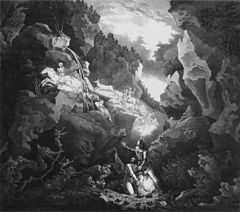 Design for the Wolf's Glen (1822, Weimar)
Design for the Wolf's Glen (1822, Weimar)
Agathe's chamber
Agathe is filled with sad forebodings. She sings of her meeting with a hermit in the forest, who told her that in some danger which menaced her, she would be protected by her bridal wreath. At the moment when Max shoots the magic bullet, the picture of Agathe’s ancestor hanging against the wall falls to the floor, slightly wounding her. Agathe's cousin and companion Aennchen replaces it. (Duet: "Schelm, halt fest!"/"Rogue, hold fast, I will teach you.") Agathe is still more disturbed, but Aennchen endeavours to cheer her with jests. (Arietta: "Kommt ein schlanker Bursch gegangen"/"Comes a pretty boy this path.")
Agathe left alone awaits Max with the news of his success, which she decides to interpret as a favourable omen. (Recitative and aria: "Wie nahte mir der Schlummer . . . Leise, leise"/"My eyelids droop in slumber . . . Low, low, sacred words".)
Max arrives; he acknowledges that he has not been the victor, but explains that he has killed a deer, which he will bring this evening from the Wolf’s Glen. Notwithstanding the prayers of Agathe and Aennchen, Max departs. (Trio: "Wie? Was? Entsetzen!"/"What, oh horror! there in the wolf’s gorge?")
The Wolf’s Glen at night
Caspar calls upon Samiel, the Black Huntsman, for assistance, and prepares the casting of the magic bullets. Max arrives and is warned by the spirit of his mother to abandon the project. Samiel conjures up the shape of Agathe, representing her as drowning herself in despair at Max’s ill success, whereupon he plunges into the glen and with demoniacal noise the casting of the bullets is begun.
Act 3
Agathe’s chamber
Agathe is praying. (Aria: "Und ob die Wolke sie verhülle"/"Through clouds obscure still shines the sun in radiant sky.") Her doubts have returned, owing to a dream of ill omen, but Aennchen again cheers her with laughter and song. (Romance and aria, subsequently added by Weber: " Einst träumte meiner sel'gen Base"/"My deceased cousin had a dream.") The bridesmaids arrive with the bridal wreath. (Song: "Wir winden dir den Jungfern-Kranz"/"We wind round thee the bridal wreath.") When Aennchen opens the box, however, she finds within a funeral wreath, which still further increases Agathe’s misgivings. She is somewhat comforted by the memory of the hermit’s promise that she shall be protected by her bridal wreath.
The meeting of the marksmen
Having split the seven bullets between them, Max has used four and Caspar has used three. Max demands Caspar give him his last bullet to use in the final shooting contest, but Caspar refuses. As Max leaves, Caspar shoots a fox, thus making Max's bullet the seventh and controlled by the Evil One.
The prize shooting
Prince Ottokar awaits Max at his tent. (Chorus of foresters: "Was gleicht wohl auf Erden"/"What excels the pleasures of the chase.") Max is now to shoot a dove. As he takes aim, Samiel, the black huntsman, appears to guide the bullet, and causes Max to fire at Agathe, who is apparently wounded. (Finale: "Schaut, o schaut"/"See, oh see, he shoots his bride.") Agathe falls, but her bridal wreath has deflected the bullet, which struck Caspar. Agathe revives from her faint. Caspar, seeing a holy hermit by her side, realizes that he has failed. Samiel grasps him instead of Max, whereupon Caspar expires with a curse upon his lips. Prince Ottokar orders the corpse to be thrown into the Wolf’s Glen, then demands and receives an explanation from Max. In spite of pleas from Cuno, Agathe, peasants, and huntsman, the infuriated Prince pronounces the sentence of banishment. Before this can be carried out, however, the hermit enters into their midst. The Prince acknowledges the holy man, and asks for his counsel. The hermit explains that the combined effects of love for Agathe, and fear of losing her should he fail the shooting trial are what caused Max to stray from a life that was formerly without fault. The hermit goes on to condemn the trial shot, suggests a probationary year as penalty, and asks who among the assembled has looked into their own heart and would be willing to cast the first stone. If Max lives a faultless life, he will gain forgiveness and be permitted to marry Agathe. The Prince commends the hermit for his wisdom saying a higher power speaks through him. The Prince ends his pronouncement by saying he, himself, will place the hand of Agathe in that of Max when the probation is over. The opera ends with the ensemble singing prayers of thanks.
Instrumentation
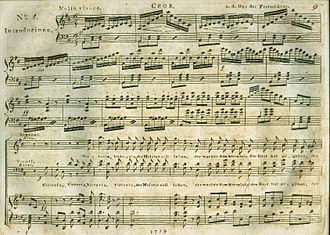 Sheet music for Der Freischütz, published by Schott Söhne in Mainz.
Sheet music for Der Freischütz, published by Schott Söhne in Mainz.
The opera "Der Freischütz" is scored for a standard-sized orchestra composed of:
In the orchestra pit: 2 piccolos, 2 flutes, 2 oboes, 2 clarinets, 2 bassoons, 4 horns, 2 trumpets, 3 trombones, timpani, strings (violin I and II, viola, cello, double bass)
Onstage: 1 clarinet, 2 horns, 1 trumpet, violins, celli
Recordings
Year Cast
(Agathe, Aennchen, Max,
Caspar)Conductor,
Opera House and OrchestraLabel 1955 Elisabeth Grümmer,
Rita Streich,
Hans Hopf,
Max ProebstlErich Kleiber,
Orchester und Chor der Radio Köln, (WDR radio production)Audio CD: Koch
Cat. No. B0000517EP1959 Elisabeth Grümmer,
Lisa Otto,
Rudolf Schock,
Karl Christian KohnJoseph Keilberth,
Berliner PhilharmonikerAudio CD: EMI Classics
Cat. No. B001BBZ96W1959 Irmgard Seefried,
Rita Streich,
Richard Holm,
Kurt BöhmeEugen Jochum,
Bavarian Radio Symphony Orchestra & ChorusAudio CD: Deutsche Grammophon
Cat. No. 439 717-21973 Gundula Janowitz,
Edith Mathis,
Peter Schreier,
Theo AdamCarlos Kleiber,
Staatskapelle Dresden & Rundfunkchor LeipzigAudio CD: Deutsche Grammophon
Cat No. 457 736-21980 Hildegard Behrens,
Helen Donath,
René Kollo,
Peter MevenRafael Kubelík,
Bavarian Radio Symphony Orchestra & ChorusAudio CD: Decca
Cat no.1990 Karita Mattila,
Eva Lind,
Francisco Araiza,
Ekkehard WlaschihaSir Colin Davis,
Staatskapelle Dresden & Rundfunkchor LeipzigAudio CD: Decca/Philips
Cat No. 4780151999 Inga Nielsen,
Malin Hartelius,
Peter Seiffert,
Matti SalminenNikolaus Harnoncourt,
Zurich OperaDVD: Decca
Cat. No.Derivative works
- In 1841, Hector Berlioz added a ballet for a production of the opera in Paris. He orchestrated Weber's piano piece Invitation to the Dance for this purpose, but the orchestration soon became principally known as a concert piece in its own right.
- Franz Liszt prepared a piano transcription of the overture in 1846 (S.575).
- The Black Rider is a stage musical by Robert Wilson, Tom Waits, and William S. Burroughs, based on Der Freischütz.
- Magic Hunter,[10] a Hungarian film, updates the story to the present time, with Max (Gary Kemp) as a police marksman.
References
- Notes
- ^ Scholes, Percy A., 1952, The Concise Oxford Dictionary of Music, London: Oxford University Press, p. 219.
- ^ Grove Dictionary of Music.
- ^ Boyden, p. 339: "The German Romantic opera really began with Der Freischütz of Carl Maria von Weber (1786-1826). See also p.284 n.2: "Indeed from Weber's Freischütz (1821) one can date the beginning of musical Romanticism."
- ^ Boyden, p. 339: "This work ... marked the emancipation of the German opera from Italian and French models ... In addition to the magic and supernatural elements, the opera specializes in local color of the forest, peasants, rustic love, hunting, and hunting horns ... the folk tale, the folk-song type of melody, and folk dances. These elements are rather naïve and nationalist in emphasis."
- ^ Fisher (2002) p. 5
- ^ Berlioz and the Romantic Imagination. Catalogue for exhibition at Victoria and Albert Museum for Berlioz centenary. Art Council, London, 1969, p242.
- ^ Festival Le Freischütz at the Opéra-Comique website
- ^ The role names, their order and voice types are from Brown 1992, p. 296.
- ^ Premiere cast from Casaglia (2005)
- ^ The Magic Hunter (film)
- Sources
- Boyden, David D. (1959). An Introduction to Music. London: Faber and Faber. ISBN 9780571091492. ISBN 0571091490.
- Brown, Clive (1992). "Freischütz, Der ('The Freeshooter') Romantische Oper in three acts" in Sadie 1992, vol. 2, pp. 296–299.
- Casaglia, Gherardo (2005). "18 June 1821". Almanacco Amadeus. Accessed 18 March 2009 (Italian)
- Fisher, Burton (2002). Weber's Der Freischütz. Opera Journeys Publishing. ISBN 1930841566
- Holden, Amanda, editor (2001). The New Penguin Opera Guide, New York: Penguin Putnam. ISBN 0140293124.
- Sadie, Stanley, editor (1992). The New Grove Dictionary of Opera (4 volumes). London: Macmillan. ISBN 9781561592289.
- Singleton, Esther (1899). "Der Freischütz", A Guide to the Opera , pp. 77-90. Dodd, Mead & Company
External links
 Media related to Der Freischütz at Wikimedia Commons
Media related to Der Freischütz at Wikimedia Commons- Recording of "Wie nahte mir der Schlummer...Leise, leise" by Lotte Lehmann in MP3 format
- Creative Commons-licensed recordings of Der Freischütz in Ogg and MP3 formats.
- Der Freischütz: Free scores at the International Music Score Library Project.
- Stanford discography, accessed 18 March 2009
- description of ELPE-Musique edition of Berlioz' recits (in German with audio samples)
Categories:- Operas by Carl Maria von Weber
- Romantische Opern
- German-language operas
- 1821 operas
- Operas
- Berlin State Opera world premieres
Wikimedia Foundation. 2010.

